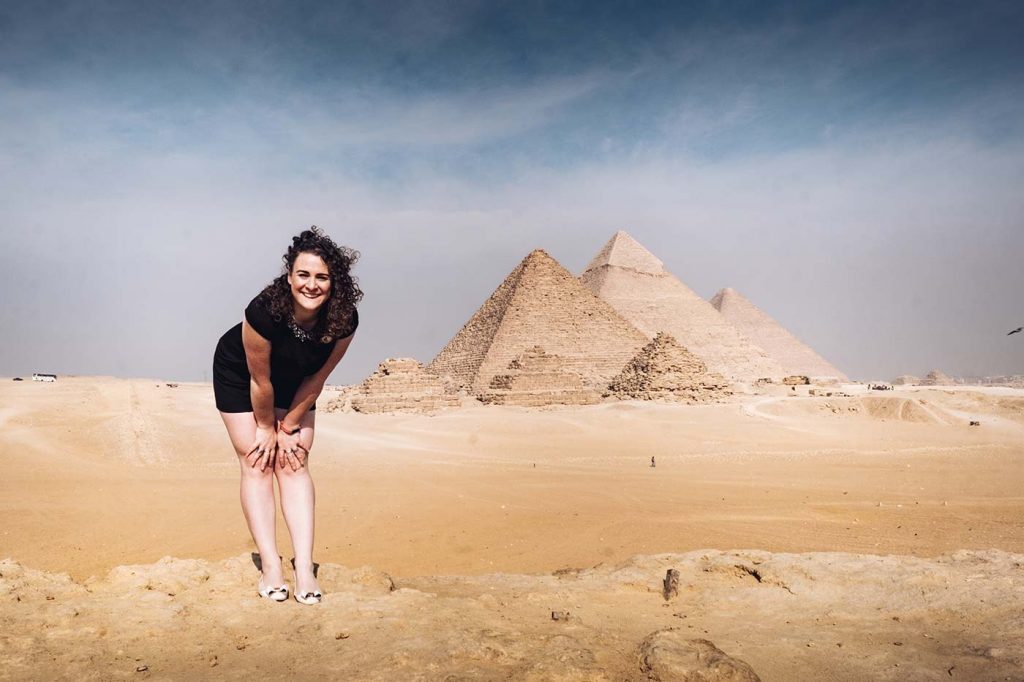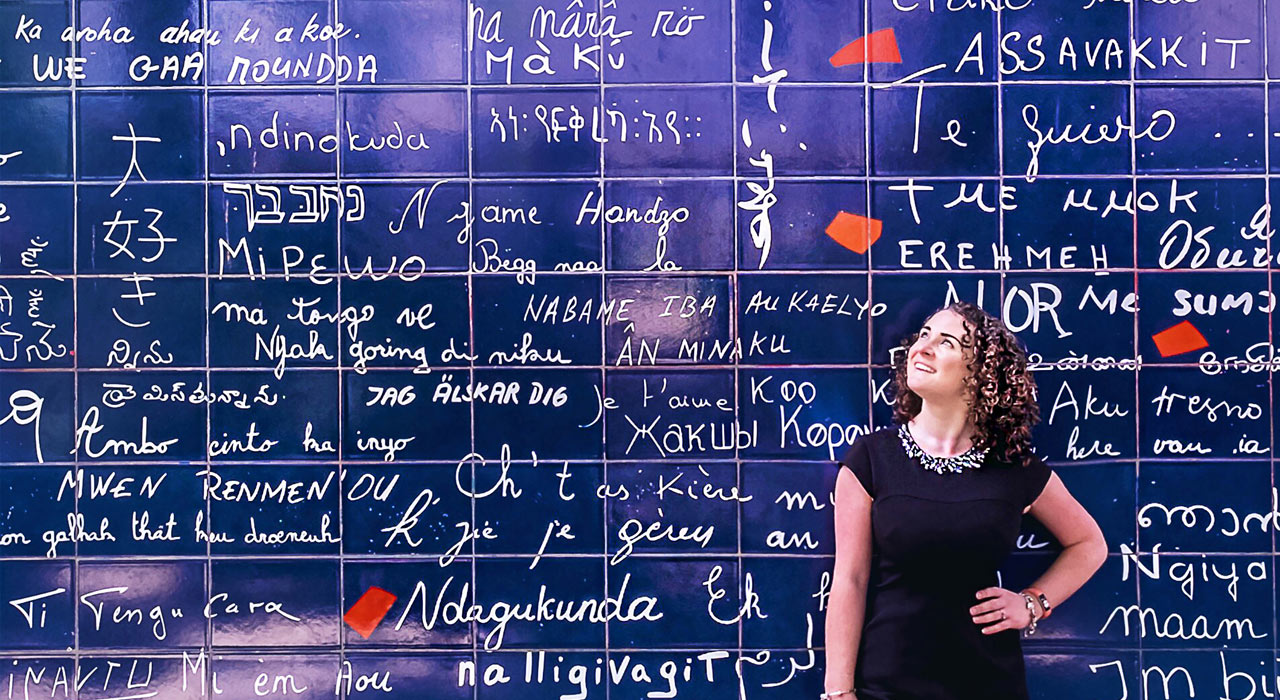Language Mentors #2: Michele Frolla – “Polyglots Aren’t Born with a Special Language Gene”
“Polyglots aren’t born with a special language learning gene that makes them more adept to learning languages. They just work hard and their passion keeps them going.” – Michele, The Intrepid Guide.
It was a pleasure to interview Michele of The Intrepid Guide for our new Language Mentors series.
Michele is an Australian language and travel blogger and behind The Intrepid Guide, where she shares her passion for languages and travel. She writes detailed destination guides, and encourages travellers to learn languages, to give them a richer experience and better interactions with the locals. I should also mention her vivid Instagram photos — take a look, they’ll make you want to hop on a plane and see the world!

Language Mentors: Learn a New Language in 90 Days
In our Language Mentors series we interview polyglots, language teachers, language learners and even folks from outside the field of language learning. We’re getting straight to the point, asking for their top tips on language acquisition, steadfast motivation, and rapid learning.
We want to give you the inside scoop on what it takes to learn a new language, fast (in as little as 90 days).
We’ve actually seen hundreds of people learn a new language to conversational level in just 90 days. You can do it too by putting what you learn from our Language Mentors into practice.
And if you need extra support, then join us in Add1 (now the Fluent in 3 Months Challenge) — where you’ll make lots of new friends who share your goal of learning a new language fast (plus you’ll have a 15 minute conversation in your new language after 90 days — we guarantee it).
Read on to learn some of Michele’s language learning hacks. And get to know some fun facts about this innovative travel blogger at the same time.
What Are the Top Three Activities You Would Advise to Have a 15 Minute Conversation in a New Language After 90 Days??
- Start with learning your biography. The most important and reusable vocabulary you will learn is all about you. Everytime you meet someone new, what do you do? You introduce yourself, you talk about your job, where you’re from and why you’re learning the language. Focus on learning this and you’ll be able to comfortably hold your first 15 minute conversation.
- Expose yourself to the language every day and use study materials that discuss topics you’re interested in. That way you’ll pick up vocabulary that will be useful to you. For example, if you love reading books, pick up a book you already know well and read it in your target language. If you enjoy cooking, trying listening to podcasts or watching YouTube videos in your target language.
- Attend a language class. This is a great way to stay on track with your language goals as it keeps you accountable. It also has a wonderful social aspect where you’ll meet similar minded people. Language classes are great because you’ll practice your reading, writing, listening and speaking.
What Are Your Top Three Favorite Places for Studying a New Language?
- I love starting off my day with a cheeky study session on the train as I commute to work. I’ll either read over my language class notes, do a couple of lessons on Mondly or Duolingo or listen to music in my target language. This helps me feel productive even before I arrive at work and sets the right tone for the rest of the day.
- I’m a huge fan of study holidays. I spent three weeks in Italy attending language classes in the morning. Then had the rest of the day to explore the city and putting into practice what I was learning. I found this to be such a great way to focus on the language and mix in travel at the same time. I plan on doing the same thing with Norwegian later this year.
- I’m a grammar girl through and through. I enjoy learning grammar because it helps me to feel more confident with the language. Before going to bed, I like to read a couple of pages from my grammar book. I usually quickly revise a previous known rule then look over new grammar points. I find this is a nice conclusion to the end of my day.

What Are Your Top Three Favorite Study Tools When You First Start Learning a Language?
- To learn the backbone and structure of the language, you’ll find my head buried in grammar books. To some people, grammar can be boring, but I love it. The trick is to find grammar books that aren’t too wordy. Have clear examples. And aren’t entirely written in your target language (at least in the beginning). Otherwise you’ll find yourself translating the explanations. This defeats the purposes and will slow you down.
- I swear by language classes. I love the accountability they provide by having a set time each week. Plus the social aspect is great for meeting new people and making friends.
- To help attune my ear to the rhythm and sounds of the language, I like listening to music in the target language. I use Spotify to help me find music in the music genres I enjoy then create a playlist. When I find a new song that I like, I usually set myself a challenge of translating it so I can learn it and sing along.
What Are Your Top Three Favorite Memories of a Language Win?
- I remember my first conversation with a stranger after I moved to Italy. My Italian was still lower-intermediate. Yet I had a very promising and interesting conversation with my taxi driver. He had a thick Roman accent and ate his words, yet I could understand him. I asked him what his favourite view of Rome was and he gave me his top two. This conversation was a win for two reasons. I could confidently hold a conversation. AND I learned something new about my new home.
- One summer I was in Palermo, Italy celebrating a girlfriend’s birthday with four other girlfriends. One night we went to dinner at a popular restaurant frequented only by locals. It’s fair to say we stuck out like a sore thumb. After about 10 minutes at our table, a middle-aged lady from a neighbouring table who was with her family enquired where we were from. Her eyes lit up when we replied in Italian. After no more than five minutes of chatting, Maria invited us around to her house the next day for coffee and cake! She gave us her number, address, and time. It was all set. I’d never in my life received such an invitation. And it was all thanks to being able to speak Italian that we were able to meet such wonderful people.
- I remember the look on my Italian friends face when I first used the expression “andare a ruba” (sell like hot cakes). She was surprised and proud of me for using this idiom correctly and without hesitation. I enjoy moments like this as it gives me a boost of confidence and encouragement to keep improving.

What Are Your Top Three Reasons to Learn a Language Before a Trip?
- By speaking the local language, you can often get much better interactions with locals. They will appreciate your effort to learn their language. This can lead to receiving better service, local tips, or even invitations like the one I had in Sicily. You don’t have to be fluent or spend a lot of time with the language. Knowing a few choice phrases can go a long way. So be sure to practice your “Buongiornos”, “Guten Tags”, and “Ohayou Gozaimasus ” before your trip.
- A side effect of language learning is becoming more culturally aware. When we are culturally aware we are more conscious of what is considered inappropriate or offensive to others. This helps us develop a deeper understanding of our own and other people’s cultures. It fosters interest in how cultures both connect and differ all while broadening the mind and increasing tolerance.
- You’ll have better and more memorable travels. Travelling isn’t just about going to a foreign land. Taking selfies in front of a few monuments. Eating your body-weight in food and then going home. It’s about experiencing the culture and the people who live it and language helps you to do that. All those micro interactions – from buying train tickets to asking strangers for directions – will be all the more enjoyable and easy.
What Are Your Top Three Favourite Activities to Do in One of Your Target Languages?
- When I’m not in the mood to read a book, I enjoy watching movies in the target language with the subtitles on. I jot down any words that appear often. I know these are common words or important in the context of understanding the story-line.
- Listening to music and translating the lyrics of my favourite songs is another fun way for me to learn and interact with the language.
- I love dining in restaurants with that specialise in the cuisine of the country I’m learning the language of. There is an almost a 100% guarantee that the staff speak my target language and this gives me a chance to put my language skills into practice.

What Are the Top Three Roadblocks You See Learners Face?
- Getting started is probably the hardest part. There are so many ways to learn a language that there is a sense of overwhelm. And there is also a lack of confidence that you CAN actually learn a foreign language.
- Boredom and losing interest.
- Hitting a plateau.
What Are Your Top Three Keys for Dealing with Those Roadblocks?
- Many people put off learning a language for many unfounded reasons. Too old. Too busy. Because they ‘lack the language gene.’ Polyglots aren’t born with a special gene that makes them more adept to learning languages. They just work hard and their passion keeps them going. Read the biographies of other polyglots and language learners. You’ll see that many of them had terrible first encounters with languages. Yet they were still able to overcome them.
- Boredom is a very common reason why language learners will often give up. Boredom is a sign that something’s wrong. If the content or resource bores you, you’re not on the right track. Remember, language learning should be (and is) fun and enjoyable. Branch out and look for different types of materials. Things that you know will hold your interest and cover topics that you’re interested in. For example, films, songs, books, podcasts, applications.
- The key to avoiding hitting a plateau is to push past your comfort zone. Challenge yourself by learning new topics and vocabulary that you’re not familiar with. Talk about current affairs with your language partner or teacher. It's a great way to expose yourself to new vocabulary. Another great way to overcome the plateau is to remember how far you’ve come. Look back over your old language notes and writing and old recordings of you speaking. This will give you the well-needed boost that will help you keep going.
What Are Your Top Three Favorite Youtube Channels for Practicing a Language?
- I’m currently learning Norwegian and Norwegian Teacher – Karin is one of my favourites. Her videos are short and get straight to the point. She also has does vlogs with subtitles which is great to hear the Norwegian spoken at length.
- As a huge fan of etymology, and the evolution of Nordic languages and the vikings, I watch Jackson Crawford’s channel. Dr. Jackson Crawford is an Old Norse specialist and his video are so informative.
He’s interesting to watch as most of the time he’s wearing a cowboy hat and films his videos out in the snow. It’s unlike anything else I’ve seen online.
- Since moving to London, it’s important for me to keep up my Italian. To do that, I like watching Learn Italian with Lucrezia. If I feel a bit rusty on any grammar points, I’ll watch her tutorial videos, but usually, I watch her Italian vlogs.
Who Are Your Top Three Target Language Idols?
- Richard Simcott is my hero. He’s a huge inspiration and super intelligent, and an all-round wonderful human being. I love this dedication to the Polyglot Community by creating such things as the Polyglot Conference.
- Luca Lampariello was the first polyglot I came across. I came across his Youtube channel when I was living in Italy and working on improving my Italian. I love his easy-to-watch and informative videos. He provides so much value and is able to simplify and explain complex concepts and methods really well.
- Benny Lewis is another language idol. Thanks to his playful nature, he’s great at taking the stress out of language learning. He reminds you that it’s ok to make mistakes and that you don’t need to know it all before you engage in a meaningful conversation. This is so important to remember. He’s not afraid of embarrassing himself in another language, and I love that. It gives me the courage to do the same.

If You Were Going to Try the Add1, What Are the Top Three Languages You Might Attempt to Learn?
- Norwegian – I’m currently obsessed with all things Norwegian and its beautiful melodic language. I’ve travelled to different parts of Norway and each time I go back I love it even more. I want to know more about the people and their culture. The best way for me to do that is to interact with them, in their language.
- French – I studied French intensively for a year. But when my favourite French teachers all left, I didn’t like the replacements. That ruined my experience and progression with the language. I’d love to go back and pick it up again as it’s such a beautiful language. Discovering its many similarities with English is always a pleasant surprise which makes it even more enjoyable to learn.
- Afrikaans – My partner is Afrikaans. I’d love to be able to speak to him in his mother tongue and with his friends when we all go out. The one struggle I’ve had is finding engaging study material to keep me interested.
What about You?
Which of Michele’s tips will you incorporate into your language routine? We’d love to hear about it in the comments section. And to our Add1 participants, best of luck on your language adventure!
Want to learn a new language in 90 days? Come join us in Add1.
A big thank you for Michele for sharing her thoughts and winning strategies with us.
To learn more about Michele, you can visit her Instagram account or her website.



Social